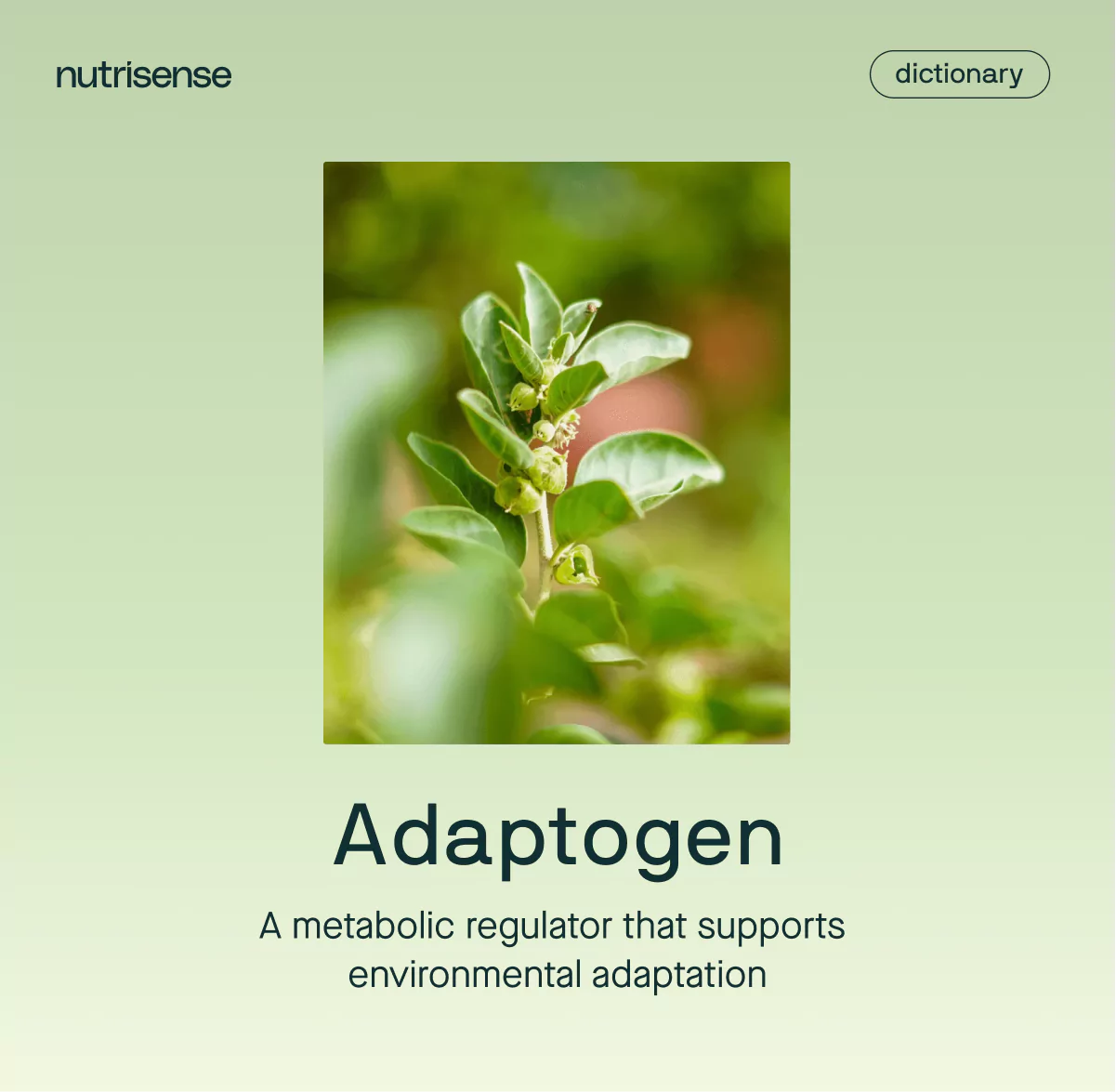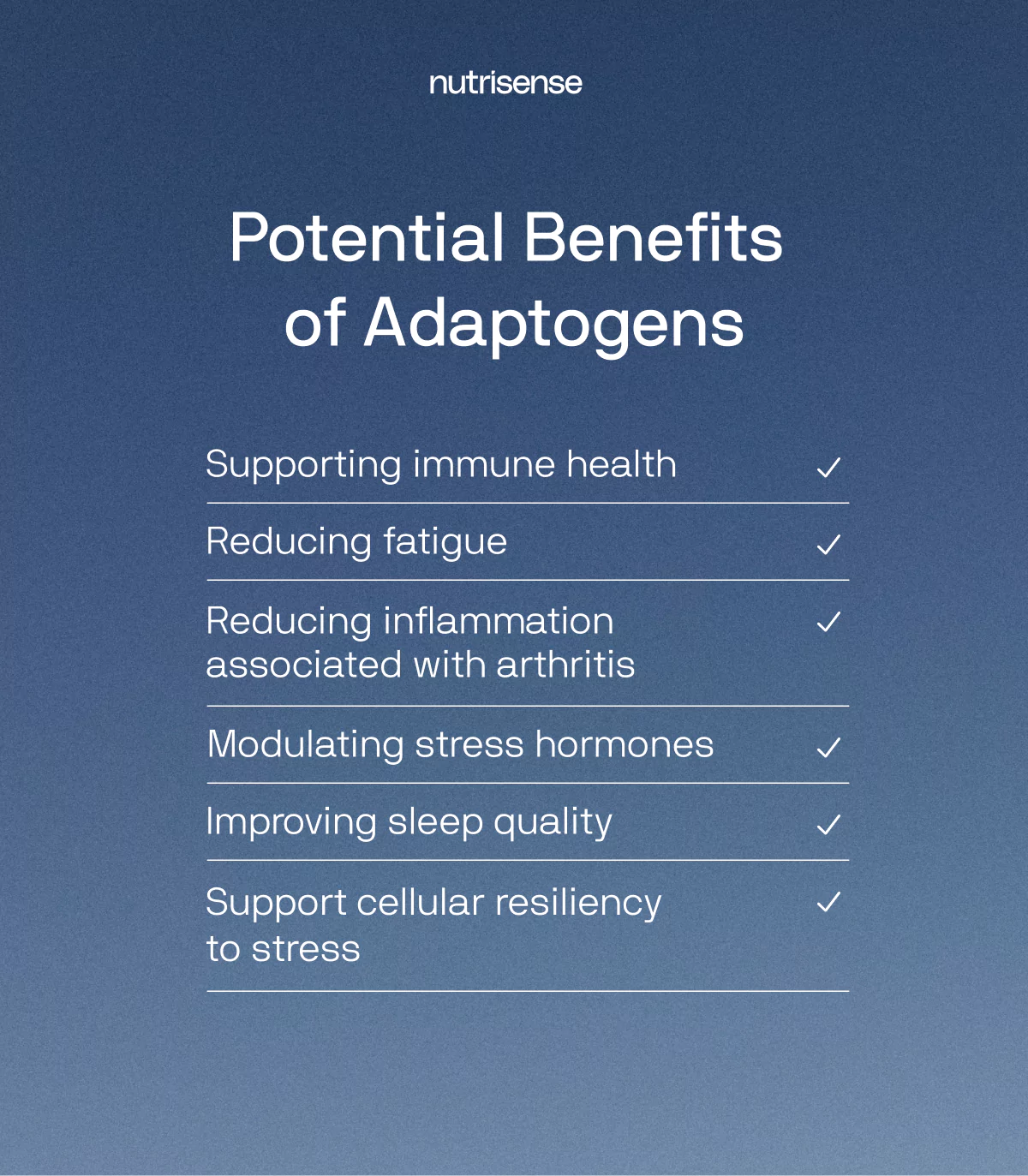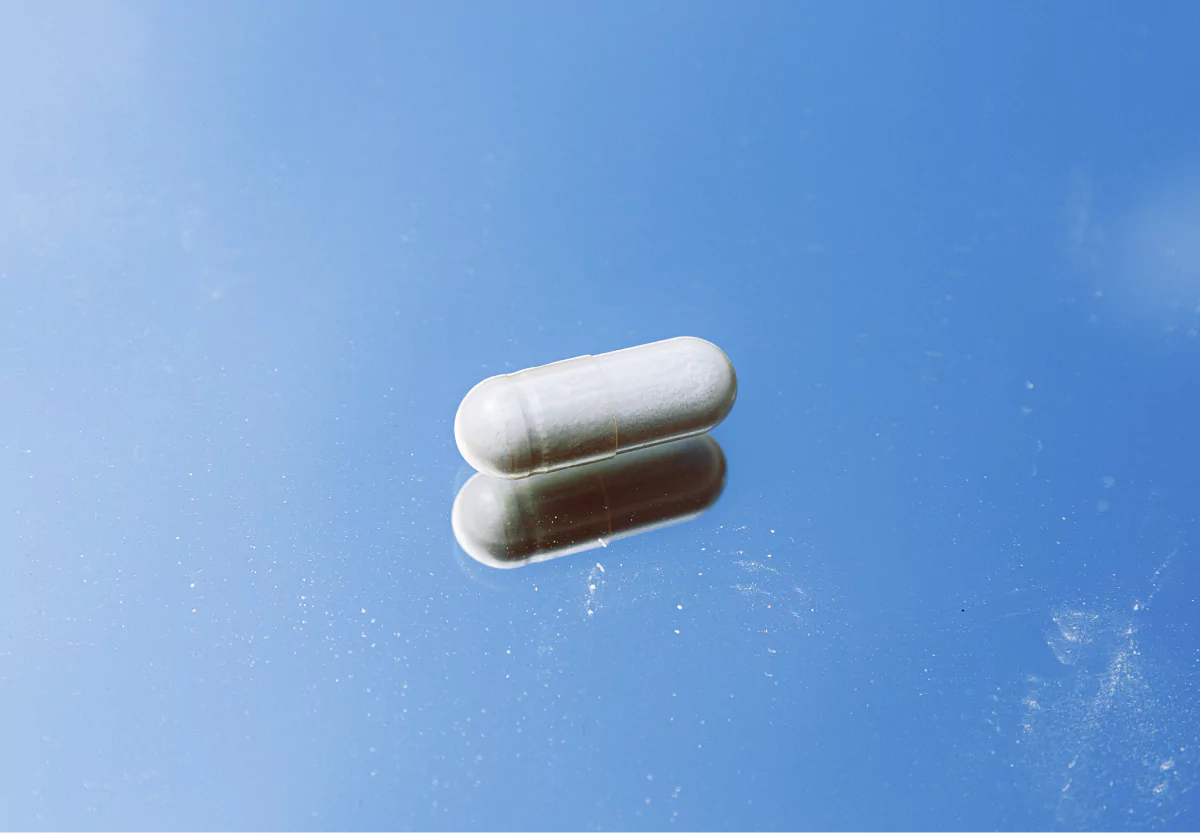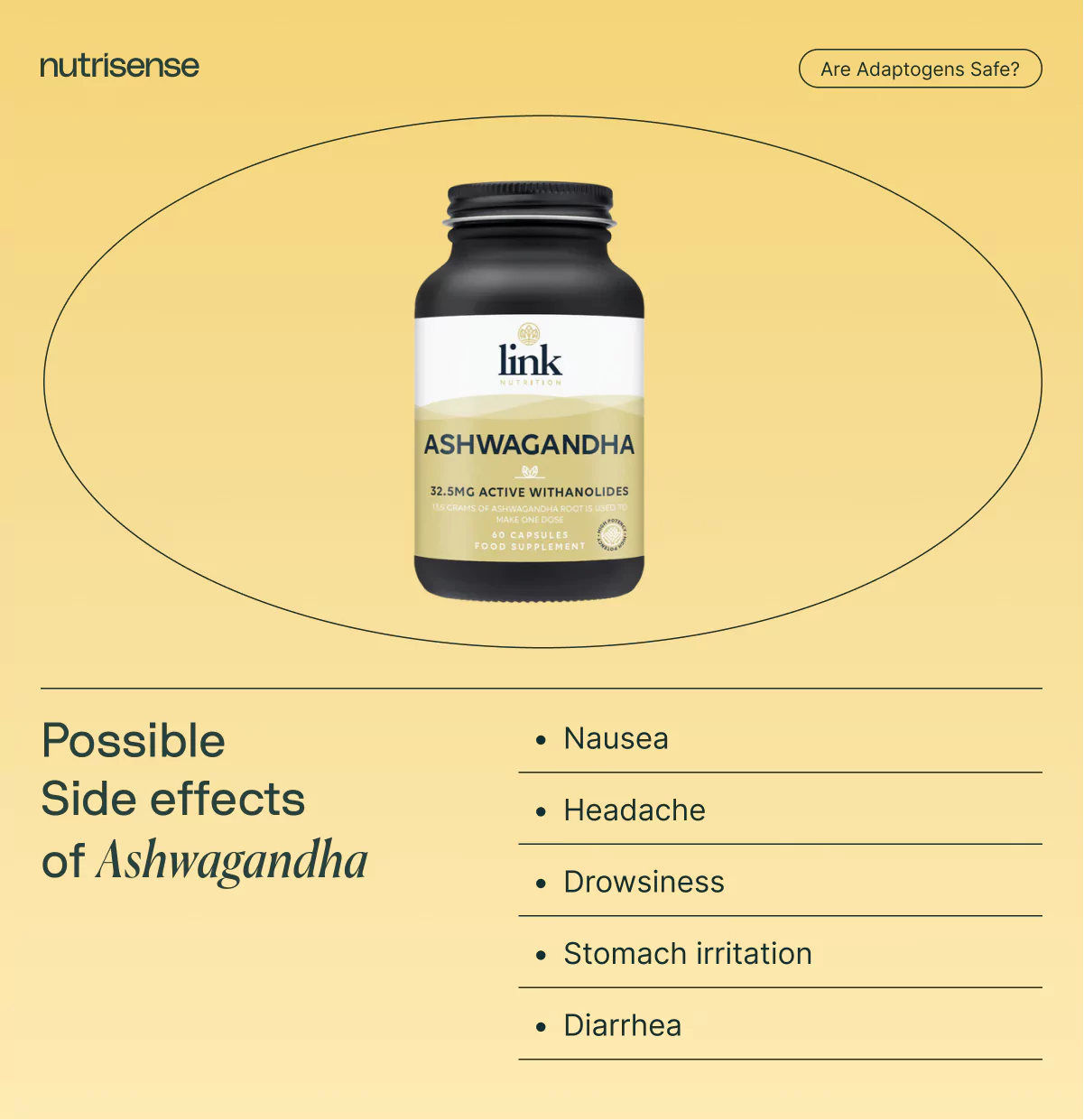What is an Adaptogen? Uses and Benefits

Key Takeaways
Adaptogens have been gaining popularity since the mid-1900s due to their potential ability to help the body respond to stress. You may be familiar with herbs such as ginseng, ashwagandha, or astragalus—these are all different types of adaptogens.
In modern day, adaptogenic herbs have become a popular remedy for cases of “adrenal fatigue,” cognitive impairment, anxiety, and are even thought to improve athletic performance.But how much do we really know about the effects of adaptogens on the human body?
Can these substances really benefit things like cardiovascular, endocrine, and immune system health? Read on to learn more about sources of adaptogens, how they may impact the stress response in the body, and what to consider if you’re thinking of trying them out.
Types of Adaptogens

The name “adaptogen” is associated with certain plants and mushrooms or even other synthetic substances thought to contain compounds that improve your body’s response to stress. Some believe they will enhance your body’s ability to maintain homeostasis in the face of many different types of stress.
Years ago, the original definition of “adaptogens” required that these compounds met three criteria:
- They must help the body adapt to nonspecific, generalized stress from a variety of sources.
- They must buffer the physical impact of stress in a way that helps the body maintain homeostasis.
- They must not harm the body.
Over time, however, the definition evolved. In 1998, the Food and Drug Administration (FDA) defined adaptogens as: “A new kind of metabolic regulator that has been proved to help in environmental adaptation and to prevent external harms.”
Natural vs Synthetic Adaptogens
Generally speaking, adaptogenic properties from natural or synthetic sources are thought to have benefits such as increasing attention and endurance and reducing fatigue. Among the more commonly used and studied plant and fungi-sourced adaptogens are:

- Panax ginseng (Korean or Asian ginseng)
- Panax cinquefoils
- Eleutherococcus senticosus (Siberian ginseng)
- Rhodiola rosea, sometimes called Arctic root or golden root,
- Astragalus, also known as huang qi
- Ashwagandha
- Licorice root
- Schisandra chinensis
- Tulsi or holy basil
- Cordyceps, reishi and other specific mushrooms such as Chaga, Lion’s Mane, and Turkey Tail
Some synthetic adaptogens include:
- Bromantane
- Levamisole
- Aphobazole
- Bemethyl
- Various synthetic nootropics
Synthetic adaptogens have been used to boost physical and mental resistance, increase blood flow, and lower levels of blood sugar and lactate in the blood. As you might expect, these have been popular among athletes looking to boost their performance. However, some of these substances are now banned from sports competition.
How do Adaptogens Work in the Body?

Adaptogenic mechanisms as they unfold in the living human body are still partially cloaked in mystery and speculation. The naturally-derived adaptogens contain a multitude of bioactive compounds, such as polyphenols, terpenoids, and other organic acids.
Some researchers claim that phenylpropanoids or tetracyclic triterpenoids or steroids found within the adaptogen have similar properties to the body’s endogenous stress-regulating chemicals, catecholamines and corticosteroids.
However, it may not be as simple as taking more of a specific adaptogen to mimic a natural hormone or neurotransmitter your body makes. Your body’s regulation of neurotransmitters and hormones is highly complex and having more of any one of these is not necessarily always better.
Adaptogens are also believed to affect the hypothalamic-pituitary-adrenal (HPA) axis and the peripheral nervous system. However, the effects of these compounds in vivo are still somewhat elusive, and the majority of studies looking to confirm the mechanisms haven’t been well-studied in humans.
Potential Benefits of Adaptogens

While some adaptogens may offer potential anti-inflammatory and anti-stress benefits, more high quality, replicable, and consistent human clinical studies are needed before we can confidently understand how or if these dietary supplements can have positive effects for everyone.
However, some of the potential benefits that some researchers believe adaptogens may provide include:
- Supporting immune health
- Reducing fatigue
- Reducing inflammation associated with arthritis
- Modulating stress hormones
- Improving sleep quality
However, more research is needed to confirm what dosages and frequencies or durations of preparations are most therapeutic. At this time, there are still many questions that remain unanswered.
Are The Benefits of Adaptogens Proven?

In vitro studies are perhaps the most common type of research done on the health benefits of adaptogens. Unfortunately, findings from in vitro studies rarely fully translate to how the compound in question behaves in vivo, or in living organisms.
In other cases of adaptogen research, the stimulating, tonic, and stress-protective activities are assessed using animals that are exposed to a variety of stressful environmental conditions. From these investigations, some researchers suggest that adaptogens may interact with heat shock proteins among a number of mediators of innate nonspecific resistance to stressors.
The relatively few studies done in humans often lack randomization or replicability and may not specify the dose of the adaptogen that was tested. However, some studies do suggest a possible benefit. Let’s take a look at some specific human trials with a few popular adaptogens.
Ashwagandha Research
There is limited but somewhat positive evidence for the Ayurvedic herb ashwagandha. A 2012 study evaluated a twice daily ashwagandha dose versus a placebo in subjects with a history of chronic stress.
This study found that there was a statistically significant decrease in all stress measurements as compared to the placebo group of the study. There was also a statistically significant decrease in plasma cortisol levels in the treatment arm versus the control arm of the study.
Another controlled trial explored the stress-relieving and anxiolytic effects of ashwagandha. In comparison with the placebo, ashwagandha supplementation was associated with a statistically significant reduction in measurements of anxiety and depression. Ashwagandha intake was also associated with greater reductions in morning cortisol and the hormone DHEA-S compared with the placebo.
Rhodiola and Ginseng Research

Rhodiola controlled studies are inconsistent, with some research reporting worsened fatigue and stress levels, while other studies show the opposite. Rhodiola has been used for thousands of years and has immuno-modulatory effect and helps to lower cortisol.
However, it can also prevent the breakdown of adrenaline which are the neutrotransmitters dealing with fight or flight response. This can be a problem for those special popoulation group who are slow at breakding down adrenals which can lead to anxiety. For this reason, caution is recommended when using rhodiola as an adaptogen.
Adaptogens and COVID Research
Another adaptogen trial was done on people with long COVID, who were given either a placebo or a liquid called “ADAPT-232/Chisan®” containing golden root, schisandra, and Siberian ginseng. Interestingly, researchers concluded that long COVID symptoms significantly decreased over the three-week period of the study. However, results may not have been as clean cut as presented.
In the study, researchers noted a reduction in fatigue, headaches, difficulty breathing, sweatiness, loss of smell and taste, hair loss, pain, attention deficit, memory issues, and mood disorders. However, most of these improvements were also noted in the placebo group.
Unfortunately, the Swedish Herbal Institute supplied the adaptogen formula and also funded the study, meaning that this study may have had a conflict of interest worth considering.
Are Adaptogens Safe?
You may be wondering whether or not adaptogenic herbs are safe to take, and at what dosage you should take them in order to get any sort of benefit. Let’s take a look at a few of the most popular adaptogens.
Ginseng Dosage and Side Effects
Taking one to two grams of Panax ginseng extract per day over a four-week period was shown to be well tolerated in healthy volunteers. However, ginseng can cause nervousness or sleeplessness, especially if taken at high doses or combined with caffeine. Other side effects are rare, but may include:

- High blood pressure
- Insomnia
- Diarrhea
- Nose bleeds
- Breast pain and vaginal bleeding
Ginseng has also been documented to interact with other herbal products as well as prescription drugs such as:
- Blood thinners
- HIV medications
- Diabetic medications
- Antidepressants
- Immunosuppressants
Astragalus Dosage and Side Effects
Astragalus may be safe when used orally in doses up to 60 grams daily for up to four months. However, it can raise plasma levels of lithium and is best avoided in those taking prescription lithium.
It is also generally avoided in people with autoimmune dysfunction because of concerns about immune stimulation. It may also interfere with immunosuppressive medications.
Ashwagandha Dosage and Side Effects

Ashwagandha may be safe when taken in the short term (up to three months) at around 600 milligrams. There is not enough information on its long-term safety at this time, though side effects of using ashwagandha may include:
- Nausea
- Headache
- Drowsiness
- Stomach irritation
- Diarrhea
Although it is rare, there have been a number of cases that link liver injury to ashwagandha supplements. For more information on herbal supplement safety, check out the herbal supplements resource center at the National Institutes of Health and consult with your doctor.
So, Are Adaptogens Worth It?

Adaptogens may positively impact your body’s stress response and minimize the effects of stress in some cases. However, longer-term research on their effect in vivo is very limited, so it’s hard to predict long-term risk versus benefit at this point.
Some adaptogens may also have little to no significant demonstrated clinical benefit but are known to have potentially serious side effects. Because of this, you should always talk to your doctor before beginning any herbal therapy or supplement to ensure it’s appropriate for you.
If you are struggling with chronic stress and looking for stress relief, adaptogens or other herbs for stress may also fail to address the underlying foundational causes of your stress. These causes may include dietary imbalances, toxic relationships, poor sleep hygiene, or other unhealthy lifestyle habits in need of an overhaul.
There are many safe and proven resources available to support you in identifying your unique stressors and helping you lower your stress levels. The important thing to remember is that you don’t have to do it alone!
Find the right Nutrisense programto turn insight into progress.
Go Beyond Glucose Data with Nutrisense
Your glucose can significantly impact how your body feels and functions. That’s why stable levels are an important factor in supporting overall wellbeing. But viewing glucose isn't enough. Nutrisense, you’ll be able to learn how to use your body's data to make informed lifestyle choices that support healthy living.
One-to-one coaching
Sign up to access insurance-covered video calls to work with a glucose expert: a personal registered dietitian or certified nutritionist who will help tailor your lifestyle and diet to your goals.
Monitor and measure what matters
With the Nutrisense CGM Program, you can monitor your glucose with health tech like glucose biosensors and continuous glucose monitor (CGM)s, and analyze the trends over time with the Nutrisense App. This will help you make the most informed choices about the foods you consume and their impact on your health.
Find your best fit
Ready to take the first step? Start with our quiz to find the right Nutrisense program to help you take control.





